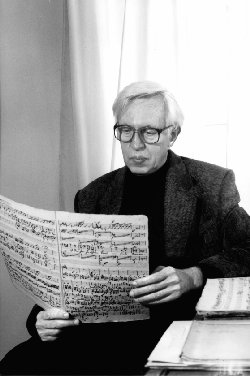Who Will Get Rights to the Collection of Bach’s Sons

Kyiv’s noted music critics and experts on culture are worried about a collection of music gathered by the sons of the great German composer Johann Sebastian Bach. It contains his works and those of other seventeenth and eighteenth century Western European composers, currently held by the Central Museum Archives of Literature, reports the Center for Journalistic Research.
In August 1999, Harvard Prof. Christoph Wolff, one of the most respected researchers of Bach, announced in the Western press that he had breathed “new life” into a collection of music never before published or studied. He further stated that he had spotted the collection (which he had been trying to find for twenty years) in the archives on the premises of the St. Sophia National Preserve in Kyiv, and that the collection gathered by Bach’s sons had been previously kept secret by the KGB.
Originally, the collection was in Germany. In 1945, it was brought to the USSR by Soviet troops. Prof. Wolff’s statement surprised Ukrainian music critics who had long known about the collection and worked with it. “Events surrounding the Bach collection are best described using the Ukrainian saying ‘They found the ax under the bench.’ I have been using the museum music stock for the past thirty years and the collection in question once belonged to the Vocal Academy of Berlin,” says Ihor Blazhko, conductor and artistic director of the Perpetuum Mobile Orchestra of the Composers’ Union of Ukraine. “I first worked with this collection back in 1969. Performing pieces from it, I announced that they were borrowed from precisely that collection and have never acted otherwise.” Mr. Blazhko further claims that the situation with the collection is developing other than officially informed by the Museum Archives. The latter’s management assures us that copies must be made so as preserve it. However, Mr. Blazhko believes that the management actually intends to sell the collection made up of 5,170 manuscripts. “We have information to the effect that the Chief Archives Directorate under the Cabinet of Ministers has reached a tentative agreement with Christoph Wolff concerning the sale of microfilms of the unique manuscripts, along with the first performance and further use rights in the US,” he points out.
Such one-time sale of the manuscripts abroad will deny Ukraine the chance to control and duplicate the music, meaning financial losses for the state, stresses Mr. Blazhko.
At the same time, Ruslan Pyrih, head of the Supreme Archival Administration, denies the above allegation, saying “There has been no such agreement with Christoph Wolff. We are creating an insurance stock (i.e., copies — Center for Journalistic Research) of the collection to secure it from theft,” Dr. Pyrih admits.
“Creating such stock is standard procedure practiced in many countries, so as to be able to duplicate the music later, on certain terms and conditions, meaning that Ukraine will receive dividends, or to enable the interested parties to use these copies, and again at a profit for the state,” says Oleksandr Fedoruk, chairman of the Committee for the Return of Cultural Valuables.
Dr. Pyrih further says that the Bach sons’ collections has never been a closed one, not even under the Soviets. “At that time Western culture was not a popular subject. It remained the prerogative of other countries, and besides we did not have many experts in the field,” stresses Mr. Fedoruk.
However, no one at the committee said anything about what will become of the collection: will it remain in Ukraine or be returned to Germany if the latter claims possession.
Ukrainian law forbids export of any archival documents. There is an agreement between Ukraine and Germany, stipulating the procedures of return of cultural valuables. However, under the circumstances, according to Mr. Fedoruk, the reciprocity principle cannot be considered a priority. The Committee chairman did not specify what would be Ukraine’s decisive argument if and when it becomes necessary to negotiate the issue with Germany, saying only that the issue was unprecedented.
Выпуск газеты №: Section






